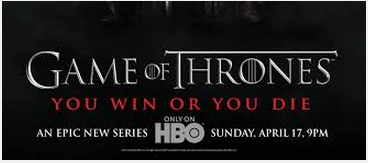HBO's step towards independence from cable could be a fatal blow to big companies like Comcast, Dish, Direct TV, Time/Warner etcetera.
HBO will soon, in time for fans of Game of Thrones season five opening on April 17, offer a standalone subscription for it's content that can be accessed through streaming devices like Apple TV, Roku, Xbox and Playstation. ESPN also recently announced similar plans.
That means that people will not have to pay the usually $100 plus monthly fees to cable giants, if they have access to wifi.
"HBO is reportedly in talks with Apple to finally launch a standalone streaming service called "HBO Now" ...International Business Times' Michael Learmonth cited sources familiar with HBO's plans in his report Wednesday. According to Learmonth, the price is expected to be $15 a month... The service is being developed in conjunction with Major League Baseball Advanced Media, which already powers streaming for networks like ESPN."
Why is this bottom-up? Currently, most people who want to view HBO, ESPN or other networks are forced to pay hefty fees plus equipment rentals to get (and pay for) huge packages with hundreds of channels they don't need. (I cancelled my contract with Comcast at the end of 2014 after they raised my rates to $160 a month, not including internet service.) Big, top-down companies offer very limited packages with very strict, unflexible hardware requirements, often also requiring two year contracts.
The future of television is going to be bottom-up, meaning people will be able to pick and choose which channels and networks they subscribe to and support, without lengthy contracts, with very flexible hardware options, cutting out the cable middlemen. This has already begun and it will accelerate as HBO and ESPN continue to add more streaming options.
It is likely that the future will bring more and more content independent of big cable. It is just a matter of time before cable news jumps from being exclusively offered through cable, and it makes sense, maybe even ought to be a law that local network affiliates who are given free air frequency rights offer free streaming access for their broadcasts as well.
Monopolistic, limited option control of television access by big cable is inconsistent with the capabilities of 21st century technologies. Netflix broke the ice on the content streaming idea. Technology companies like Apple TV, Roku, Xbox and Playstation broke the ices on the tech side. It won't be long before every consumer will have a menu control software panel that allows selection of a unique collection of channels. Maybe the cable companies will develop the technologies and packaging so they can stay in business, maybe not. Think Blockbuster and rooftop TV antennas.
There will be strong advantages that drive networks to offer streaming options. They'll have direct contact with consumers, will cut out giving profits to the middlemen, and will be able to build two way, bottom-up conversations with viewers, instead of the old, top-down big three network model of one-to-many, one way communications.
I'm thrilled with this option. HBO offers some of the best news reporting, via VICE and John Oliver, as well as smart entertainment programming. Signing up for HBO alone allows me to support and subscribe to HBO without subscribing to networks I dislike.
A big problem is that in too many areas cable TV, especially the giants, like Comcast, have monopolies on the internet access. In some states it is literally illegal for municipalities or counties to provide free WIFI. These are clear examples of how politicians have been bought by big cable. As more and more content that was only available on cable becomes available via streaming, this will put more pressure for more consumer choices for WIFI.
Crossposted from Opednews.com

